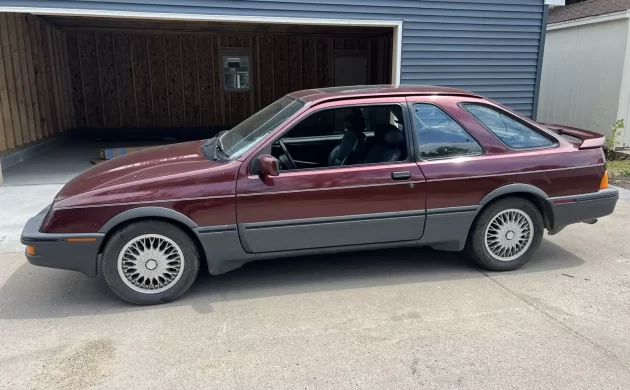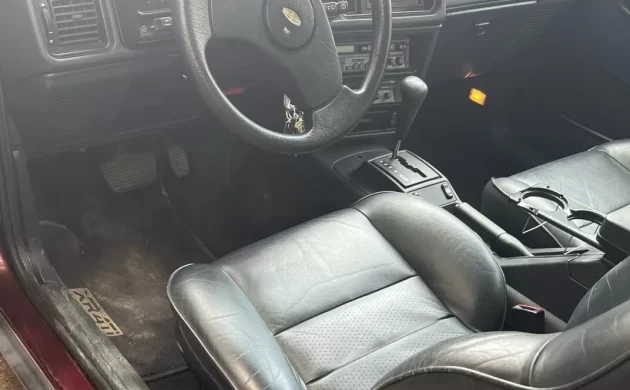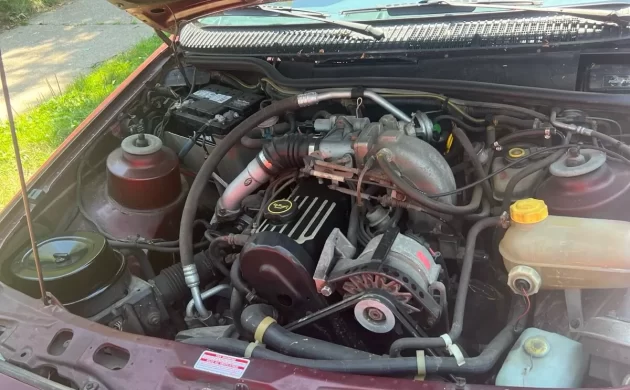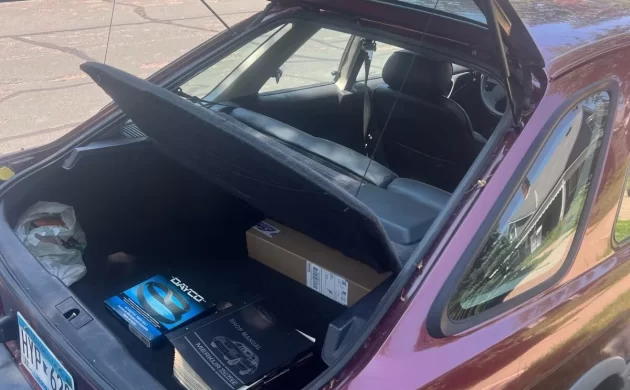Euro Ford Survivor: 1989 Merkur XR4Ti
It seems that Bob Lutz has always had the enthusiast’s back. Meaning, he has a long track record of bringing over European-market models that he felt had a sporting chance at competing with the dominant sports cars of the day. Now, every car has lobbied his employer to bring over wasn’t a home run, but it’s hard not to appreciate the guy for flagging some interesting models that we might not have otherwise experienced. The Merkur XR4Ti is a perfect example of a German-made Ford product that showed up as a turbocharged hot hatch in the late 1980s.
It’s amazing how many times we read about the domestic manufacturers wanting to compete with the European luxury brands. This continues to this day with Cadillac, and unfortunately, it doesn’t look like the attempt at wooing Mercedes buyers has gotten any more effective over time. We just wrote about how the Cadillac Allante was built to entice R107 shoppers into GM showrooms, and with the XR4Ti, Lutz was hoping to sway the steadfast BMW 3-Series shoppers into Mercury showrooms. The leather interior inside the Merkur is in great shape, but you’ll notice one fatal flaw: the automatic transmission.
Now, I am not an automatic hater, but this car is simply better with the manual gearbox. In a way, I wonder if the transmission represents the biggest challenge with the XR4Ti: being sold at a Mercury dealer, car shoppers were likely looking for a luxury model, not a turbocharged sports car. Therefore, the automatic would be a more logical choice for someone exploring a new model sold beside the Grand Marquis they came into the dealership to look at. Sadly, this 175 horsepower four-cylinder was paired to a sleepy 3-speed automatic.
The Merkur has occupied plenty of space in the hearts and minds of both European car fans and Ford enthusiasts who enjoy the years of turbocharged products like the Mustang SVO. There are numerous ways to crank up the performance of these winged wonders (although, it’s worth noting this Merkur doesn’t have the trademark bi-plane rear spoiler like most examples, and makes do with a much more subdued lip-style spoiler) but I’d leave this bone-stock example alone. The seller claims it’s a one-owner car and it’s listed here on eBay with bids to $3,000 and no reserve.
Auctions Ending Soon
 2006 Ford Mustang Saleen S281 SCBid Now3 hours$17,000
2006 Ford Mustang Saleen S281 SCBid Now3 hours$17,000
 2002 Subaru Impreza WRXBid Now3 days$333
2002 Subaru Impreza WRXBid Now3 days$333
 1975 Chevrolet Corvette ConvertibleBid Now3 days$3,000
1975 Chevrolet Corvette ConvertibleBid Now3 days$3,000
 1964 Ford F-100 Camper CustomBid Now3 days$2,000
1964 Ford F-100 Camper CustomBid Now3 days$2,000
 2006 Jeep Wrangler SportBid Now5 days$10,500
2006 Jeep Wrangler SportBid Now5 days$10,500





Comments
Thank you Jeff.
I don’t have first-hand experience with Merkurs, and don’t know all that much about them. But they are interesting to me, mostly from a marketing perspective. Using this XR4Ti as an example, it has sporty, attractive styling and is nicely trimmed, and with the turbo four had decent performance. I’ve read (here and elsewhere) that those who have owned them have had mixed experiences: some liked them and had good luck with them, others not so much. (Basically true for most car models, I figure.) So why were they not particularly successful in the US?
Did it come down to two decisions: the Merkur name, and placement in the Mercury showroom? The name was (and still is) odd, and the demographics at Lincoln-Mercury didn’t really ‘fit’. The Ford car line-up at the time was Crown Vic, Taurus, Tempo, Escort, Mustang, Probe, Thunderbird; I’m guessing execs thought that was enough, and it needed to go elsewhere.
But as it turned out, it largely was wrong place, wrong time.
Merkur is Mercury in German. As these cars were built by Ford Germany, you can see how Ford Marketing got to this branding.
These cars were derived from the EU/UK Sierra. Ford US couldn’t use the Sierra name as it was already taken. XR4Ti was a submodel of the UK/EU Sierra so I think that’s how they got to that one! Talk about circuitous.
Do a search for the Sierra Cosworth and you’ll see another model that was our shores were denied.
https://bringatrailer.com/listing/1987-ford-sierra-cosworth-2/
To clarify further, GM already had models in the US market named Sierra (GMC) and Ciera (Oldsmobile), so Ford couldn’t use Sierra here. The Euro market sporty Sierra was the XR4i package, so they added the “T” here to highlight the turbocharged engine.
I think it might’ve been Ford trying to do a “world car” thing. The XR4i was a relatively low-run homologation special; it was mostly destined for European and Australian touring car racing as I remember, the extra spar stiffening the shell over the standard 3-door.
In hindsight, Ford probably should have just canceled or renamed the Fox-body Mercury Capri, so they could revive using Capri as a well-recognized submarque for sporty imported Euro Fords sold through Mercury dealers, rather than inventing the hard-to-pronounce Merkur brand with zero name recognition. They could even use the same Lincoln-esque logo they designed for Merkur and have it simply say Capri instead.
Then, as with the original Capri imports, this model would have started out badged as simply a Capri (no other marque or model), then later they might give it more specific model designation (maybe just XR4, as XR4Ti was too much alphabet-soup) when they added a sedan model as the Capri Scorpio. Mazda-built captive-import Mercury models such as the first-gen Tracer and the final Capri roadster (badged as, say, a Capri Barchetta or XR2?) could have slotted in as well, to expand Capri into a full-line captive-import marque.
Possibly a Capri Sapphire, the Sierra 4-door sedan for those wanting four doors. The Scorpio was the wrong car for that market, it was too expensive and looked too much like a Mercury Sable.
I loved these cars and as an LM Merkur dealer I probably sold more than most and owned an 87′ myself, 5 spd and no dealer tag. Ford did not upgrade these as they should have. Automatics should have went to 4 speed AOD and engine should have gotten the intercooler like the Tbird did. They had the same engine, hand assembled in Brazil. The 5 speed was kind of weak but could be replaced with one from the Turbo TBird. Don’t use one from the Mustang V8, gearing for the turbo model was altogether different.
I agree, the 5 speed was the weak link in the one I owned. I replaced or had the tranny rebuilt 3 rimes before I wised up and traded it in for something far more reliable.
As usual, Bob, you nailed it.
Part of the problem at least by 1989 was that the T-Bird SC was a better car in almost every way.
The auto trans wasn’t just power-sapping; it also required detuning the engine from 175hp down to 145hp, mostly by reducing the turbo boost pressure.
These later models lost the biplane spoiler due to a revised hatch with a larger rear window, but if you really want it you can swap the entire hatch with spoiler from an earlier donor model. ’87-on models did get other numerous improvements carried over from the Euro-market Sierra, including a revised dashboard less prone to cracking and a quicker steering ratio reducing the lock-to-lock and turning radius.
Yep, the automatic was a dog.
When I was in the market for one of these, I visited a dealer who had several slightly used ones, so I was excited to go and have a look.
They were all automatics and I was walking away when the salesman (friend of mine) convinced me to take one for a drive. Needless to say, I kept on shopping.
Sold $3350. One of the cleanest ones I’ve seen in years. Too far away, or I’d own it.
I remember reading an article a few years ago about upping the performance on these babies via a 302 transplant. Don’t recall the details but seems it was an easy drop in project. I was looking for one but the availability of the car never matched the availability of my cash.
There was a South African variant of the Sierra called the XR8 that got a 302 Windsor, so that swap seems plausible.
Had one, at the time they were known for turbo failures. Bought a used one on it’s third turbo which was already whining. Seems typical Americans just loafed around in these cars, and the turbos loaded up with carbon up and failed. I was in my racing days then, and drove the crap out of the Merkur, redlining all the time. The turbo quickly quieted down and was happy for as long as I owned the car.
I always thought they should have stuck with the Sierra styling – one large window behind the driver and passenger. The British versions just looked better, and the original spoiler was just too much.
They prolly went with the XR4i greenhouse because it was more distinctive looking and allowed for pop-out rear quarter windows for better backseat ventilation.
I bought one of the first batch delivered, took it of the showroom floor in Hayward CA. We had a Sierra rental in Germany a year or two earlier and liked the size, ergonomics, etc along with the water-cooled turbo coming to the USA. The turbo bushings coked up anyway but Rapido Motors had a Ford Motorsports turbo rebuild kit. The dealer offered to sell me a new turbo.
That manual was actually a parts-bin 4 speed that Ford was putting in to the Capri and they tacked a fifth gear on the back. Lift-off started popping the tranny out of gear but bungie cords were plentiful when the dealers could not fix it, until I replaced it with BW T-5.
In about 1988 we were treated to a Trans-Am race at Sears Point with Merkur in the pack Scott Pruett was driving and Edsel Ford promised us he would always stand behind us. (I guess he didn’t know that reverse still worked.) Shortly after, they dropped the Merkur, and I dropped Ford, will not buy another one of their products.
The automatic did not have 175 HP, only the 5 speed did. The automatic got less boost and made 145 HP. I owned 2 of these, they drive great, but electrical issues, a/c issues, both transmissions were weak. They were a big money pit.